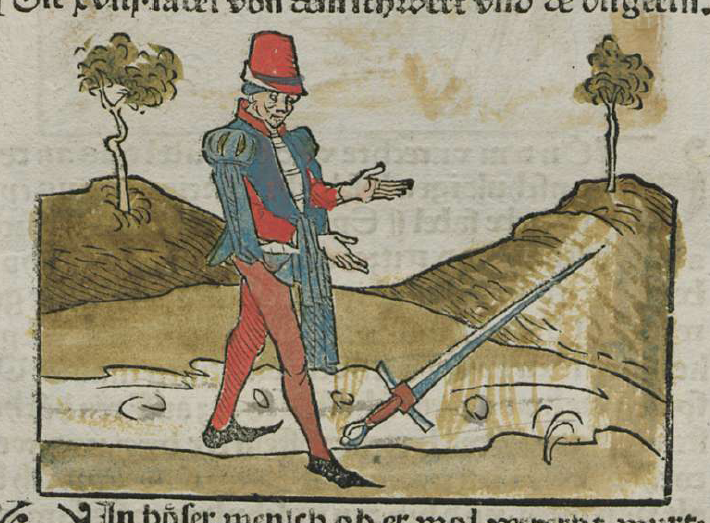Here is the prose version he started from, with the "moral" of the story first, and then the actual story, which features a talking sword!
Homo malus multos perdit et ipse solus perit. Gladium viator dum ambulabat iacentem invent in via quem interrogavit: quis te perdidit? Cui contra telum: me quidem unus; ego vero multos.
Here is the reconstructed iambic poem:
30. Gladius
Here is the poem written out in English prose order to help in reading:
As you can see, the word play depends very heavily on the ability of Latin to imply words from context for a really succinct comeback by the sword, along with the double meaning of the verb perdo, meaning "to lose" but also "to lay waste, destroy," etc.
The meter is iambic:
Here is an illustration from Steinhowel's Aesop, and I included Caxton's 15th-century English version too. It appears in Caxton as part of the medieval fable tradition, even though it is not part of the classical tradition. Personally, I can totally imagine this having been a fable of Phaedrus. :-)
Here is the reconstructed iambic poem:
30. Gladius
Malus multosque perdit et solus perit.
Gladium viator in via quem invenerat
Iacentem interrogavit, "Quis te perdidit?"
Cui contra telum, "Me unus, sed multos ego."
Here is the poem written out in English prose order to help in reading:
Malus
et perdit multos
et perit, solus.
Viator invenerat gladium
iacentem in via.
Viator interrogavit gladium,
"Quis perdidit te?"
Telum viatori contra [dixit],
"Unus [perdidit] me,
sed ego [perdidi] multos."
As you can see, the word play depends very heavily on the ability of Latin to imply words from context for a really succinct comeback by the sword, along with the double meaning of the verb perdo, meaning "to lose" but also "to lay waste, destroy," etc.
The meter is iambic:
Malus · multos · que per · dit et · solus · perit.
Gladium · via · tor in · via · qu~ inven · erat
Iacent~ · inter · roga · vit Quis · te per · didit?
Cui con · tra te · lum M~ u · nus, sed · multos · ego.
Here is an illustration from Steinhowel's Aesop, and I included Caxton's 15th-century English version too. It appears in Caxton as part of the medieval fable tradition, even though it is not part of the classical tradition. Personally, I can totally imagine this having been a fable of Phaedrus. :-)

4.18. De gladio et viatore
Caxton: Of the pylgrym and of the swerd /
An euylle man maye be cause of the perdycion or losse of many folke / As reherceth to vs this present Fable / Of a pylgrym / whiche fond in his way a swerd / And he asked of the swerd / what is he that hath lost the / And the swerd answerd to the pylgrym / A man alone hath lost me / but many one I haue lost /
[more info]
Caxton: Of the pylgrym and of the swerd /
An euylle man maye be cause of the perdycion or losse of many folke / As reherceth to vs this present Fable / Of a pylgrym / whiche fond in his way a swerd / And he asked of the swerd / what is he that hath lost the / And the swerd answerd to the pylgrym / A man alone hath lost me / but many one I haue lost /
[more info]
No comments:
Post a Comment
Comments are limited to Google accounts. You can also email me at laurakgibbs@gmail.com or find me at Twitter, @OnlineCrsLady.